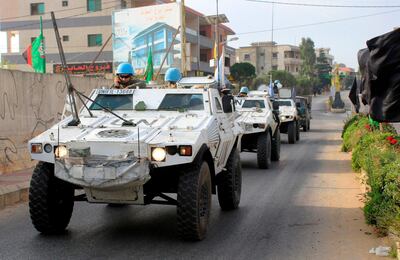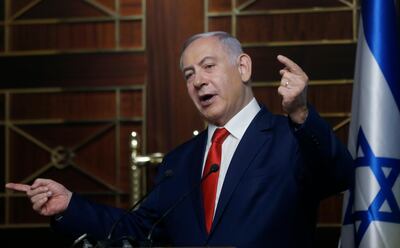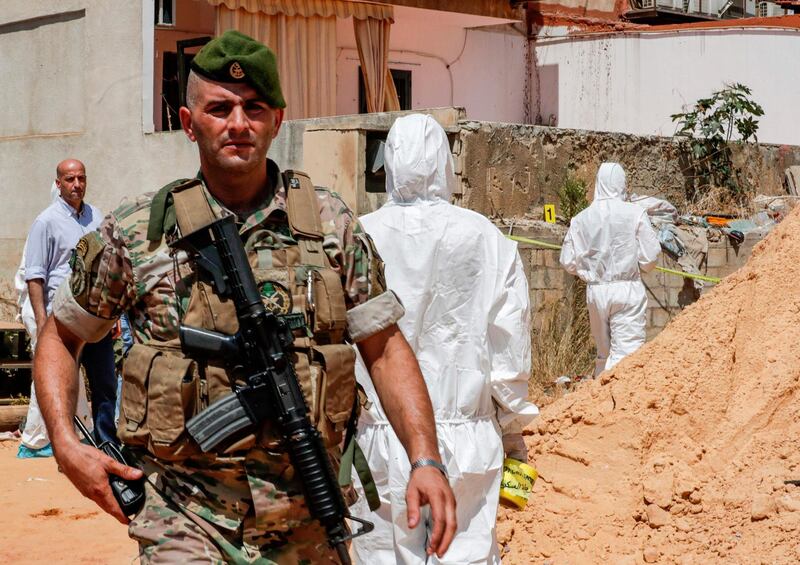The recent shift in the rules of engagement between Israel and Iran indicates that keeping military skirmishes under control can no longer be achieved using the same subtle means as before, as is becoming evident in proxy wars in Lebanon, Iraq and Syria. Over the past several weeks, Israeli Prime Minister Benjamin Netanyahu has stepped up operations against Tehran-linked targets, attacking Iranian positions in Syria, rocket-manufacturing facilities run by Hezbollah in Lebanon, and camps belonging to the Iran-backed Popular Mobilisation Forces in Iraq.
The previous theory that mutual deterrence could contain such attacks without having to go to war can no longer be guaranteed. On the Iranian side, the instructions of Supreme Leader Ayatollah Ali Khamenei are being carried out by the Islamic Revolutionary Guard Corps, led by Quds Force commander Qassem Soleimani, who oversees Iran’s proxy wars. Yet the duel between Mr Netanyahu and Mr Soleimani might not evolve into a military confrontation beyond the scope of its current boundaries.
Under the assumptions that come with this scenario, Hezbollah chief Hassan Nasrallah will not carry out his threats and will content himself and his supporters with a limited response to Israeli attacks, coupled with reassurances to Israel on the issue of rocket production in Lebanon. But if Iran’s leaders decide the time has come to respond in force to Israeli assaults on their assets in the region, Hezbollah might respond in a way that could trigger an Israeli war on Lebanon.

According to informed sources, the final decision will be made following a crucial meeting of the IRGC, attended by Hezbollah and the PMF, possibly in Beirut. The meeting could also decide on a response to not just Israeli but also US measures, as Washington has stepped up its economic sanctions, this time targeting new Lebanese and Iranian entities.
On the American side, Washington will also host an important meeting next week on Iran following the G7 summit in Biarritz, where France once again proved its policy is more about theatrics than seriousness. French President Emmanuel Macron put forward an initiative to bring together US President Donald Trump and his Iranian counterpart, Hassan Rouhani, but failed to account for the necessary delicate conditions for the two leaders to meet, with the whole gambit backfiring against Mr Macron as soon as his joint speech with Mr Trump was over. As for inviting Iran's Foreign Minister Mohammad Javad Zarif to Biarritz, that was foolhardy, based on the reactions from Mr Trump and British Prime Minister Boris Johnson to what amounted to a stunt. EU nations are struggling to maintain coherence in their Iranian policies, caught between the interests of their companies and banks, and their ongoing accord with Iran and its chief envoy.
The EU’s foreign policy chief Federica Mogherini has put forward the bloc’s conditions for US-Iranian talks, saying Brussels supports negotiations, providing that the nuclear deal between Iran and the P5+1 countries is preserved. This is an astonishing intervention that also betrays both naivety and bias. Indeed, Washington wants to renegotiate the nuclear deal while Tehran refuses any talks without the lifting sanctions first, and it is unwise for the EU to place conditions, especially ones that favour one side in any such negotiations.
Mr Macron wants to resurrect the P5+1, the group of countries that negotiated and concluded the nuclear deal, and reach an agreement that would allow Iran to sell its oil under strict international monitoring as an alternative to the Instex special purpose vehicle. Mr Trump responded by saying this was possible if Iran agreed to change its behaviour in the Middle East, in addition to meeting demands related to its nuclear and missile programmes. However, Iran has rejected these demands and Mr Rouhani, after first implying he was open to meeting Mr Macron without conditions, then insisted on talks being conditional on sanctions being lifted.
It begs the question: why do European nations not object, or even tacitly consent to, Tehran’s creation and operation of irregular armies in sovereign countries such as Lebanon and Iraq? Under the nuclear deal, Europe gave its blessing to Iran’s military intervention in Syria, after agreeing to Tehran’s conditions of excluding its regional excursions from the negotiations and to invalidating previous UN Security Council resolutions prohibiting Iran from doing just that. European inconsistency becomes even more apparent when it comes to safe navigation across the Strait of Hormuz. Europe is calling for protecting the freedom of navigation there while objecting to US leadership of a maritime taskforce designed to do just that, to avoid provoking Iran.
If such incoherence in policy persists, it will do the utmost damage to any effort to reach a US-Iranian accord. Instead, European countries should encourage Iran's leaders to adjust their behaviour and refrain from making threats that could escalate the situation further. In Iraq, Iran continues to block the efforts of prime minister Adel Abdul Mahdi to integrate the PMF into the armed forces, dismantle its checkpoints and cut off their links to political entities under a one-month ultimatum. Tehran is preventing the Iraqi government from taking control of its security and political decision-making and insists on using the PMF to sabotage Iraq and threaten US interests.
In Lebanon, the situation has crossed a dangerous threshold after two Israeli drones crashed into Beirut's southern suburb last week. Mr Nasrallah threatened to retaliate and Israel has mobilised in anticipation. The Israeli army recently accused Iran of stepping up its efforts to pass precision rocket-manufacturing capabilities to Hezbollah on Lebanese territory, instead of transferring fully assembled rockets.

The Hezbollah chief has left everyone holding their breath, after declaring on Sunday that he alone will decide where, when and how he will respond to the Israeli drone incursion. In other words, he holds the decision of war and peace in Lebanon. Lebanese President Michel Aoun has described Israel's actions as a "declaration of war" and on Wednesday, Lebanese soldiers opened fire on Israeli drones circling near a military camp on the border.
Lebanon today is threatened not just by Iran and Israel but also the US. Washington has made clear its intention to step up sanctions on Iran, Hezbollah and every organisation providing them with political, financial or security cover. Washington has also signalled that if Hezbollah attacks Israel, the Trump administration would fully support an Israeli response and would hold Lebanon’s government responsible for the escalation.
Ultimately, Lebanon is in the eye of the storm. Mr Netanyahu has made it clear to Russian President Vladimir Putin that Israel will not refrain from taking firm measures to stop Iran's projects in the region. Mr Putin has tried to dissuade him from crossing red lines but will not stand against Israel as this would be against Russian interests. For all these reasons, Lebanon must carefully assess the situation and not recklessly rush into a confrontation.





